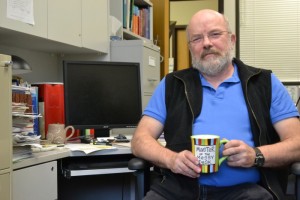Know Your Profs is an ongoing series of profiles on the instructors at Camosun College. Every issue we ask a different instructor at Camosun the same 10 questions in an attempt to get to know them a little better.
Do you have an instructor that you want to see interviewed in the paper? Maybe you want to know more about one of your teachers, but you’re too busy, or too shy, to ask? Here’s what you can do: email editor@nexusnewspaper.com and we’ll add your instructor to our list of teachers to talk to.
This issue we talked to longtime Nursing chair Stephen Bishop about playing underwater hockey (!), the joys of student breakthroughs, and getting out on the water as much as possible.
1: What do you teach and how long have you been a teacher at Camosun?
I’ve been with the Camosun Nursing department for 15 years as an instructor in lab, theory, and clinical. I’ve also been a program leader and the curriculum chair and served for the past seven years as department chair. My nursing background includes 25 years in pediatric intensive care, where I worked until this year. I’ve just returned to teaching and it was great to get back to the classroom and to clinical education.
2: What do you personally get out of teaching?
I love interacting with students who are excited to learn, and then seeing those students as graduates out in the hospital or community engaging in their nursing careers. It’s pretty special to see nurses I’ve had a hand in educating providing brilliant care in our community.

3: What’s one thing you wish your students knew about you?
Believe it or not, I was an athlete. I played underwater hockey (Google it!) for 35 years, medalling at provincial and national tournaments. It’s a great sport that needs more participants, so if you like to snorkel or scuba dive, come talk to me!
4: What’s one thing you wish they didn’t know about you?
That I occasionally “word search.” I lose a word in mid-sentence and have to stop talking and try to pull it out of my brain, or do impromptu charades. My students are generally very helpful throwing out suggestions… usually correct!
5: What’s the best thing that’s ever happened to you as a teacher here?
When I feel like I’ve really made a difference to a student, that’s an amazing feeling. When someone “gets” something that just wasn’t making sense, or when you can help someone navigate a problem and feel that they can be successful when they were feeling despondent, that’s when I feel I’m in the right place.
6: What’s the worst thing that’s ever happened to you as a teacher here?
I’ve worked with several students who were struggling with depression, where I was completely unable to make enough of a difference for them to succeed. I have huge respect and gratitude for the members of the counselling department for the work they do.
7: What do you see in the future of postsecondary education?
Sadly, I believe it’s in jeopardy. In Nursing we teach a combination of academic theory and hands-on practice, which makes Nursing a very expensive program. While I want to believe funding will keep up with our needs for technology in the classroom, and time in lab and clinical settings, I see funding restrictions slowly eroding the quality of our programs. Students and faculty need to work together to prevent this happening.
8: What do you do to relax on the weekends?
Anything that involves water feeds my soul; sailing is a priority. Preferably with family and friends, though solitary time can be precious as well.
9: What’s your favourite meal?
Food is an excuse for socializing, so anything that involves conversation over red wine and single malt scotch.
10: What’s your biggest pet peeve?
People not being accountable for the outcomes of their actions. There are always factors outside our control that contribute to something such as a bad grade, but before blaming others we need to acknowledge our own responsibility.
